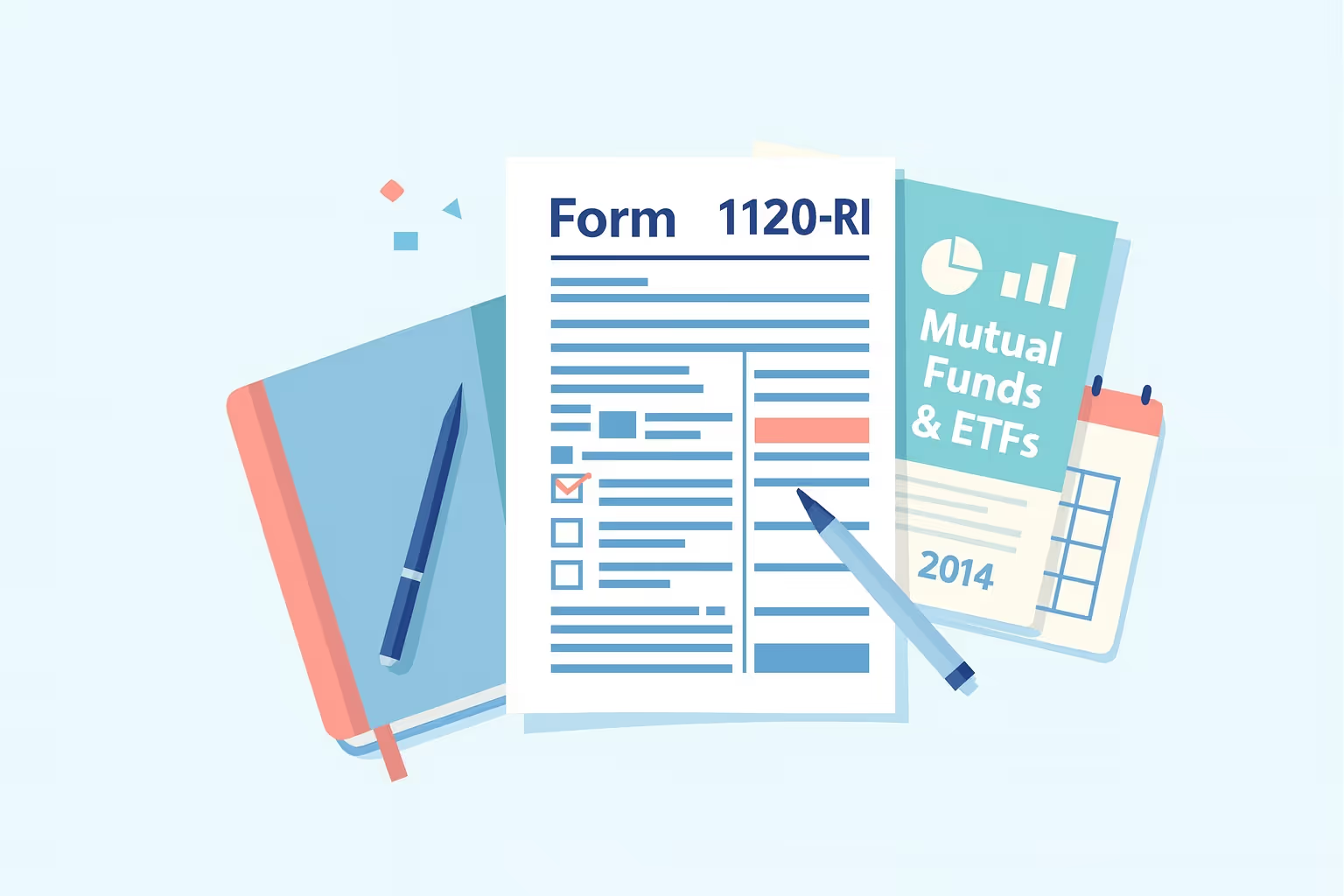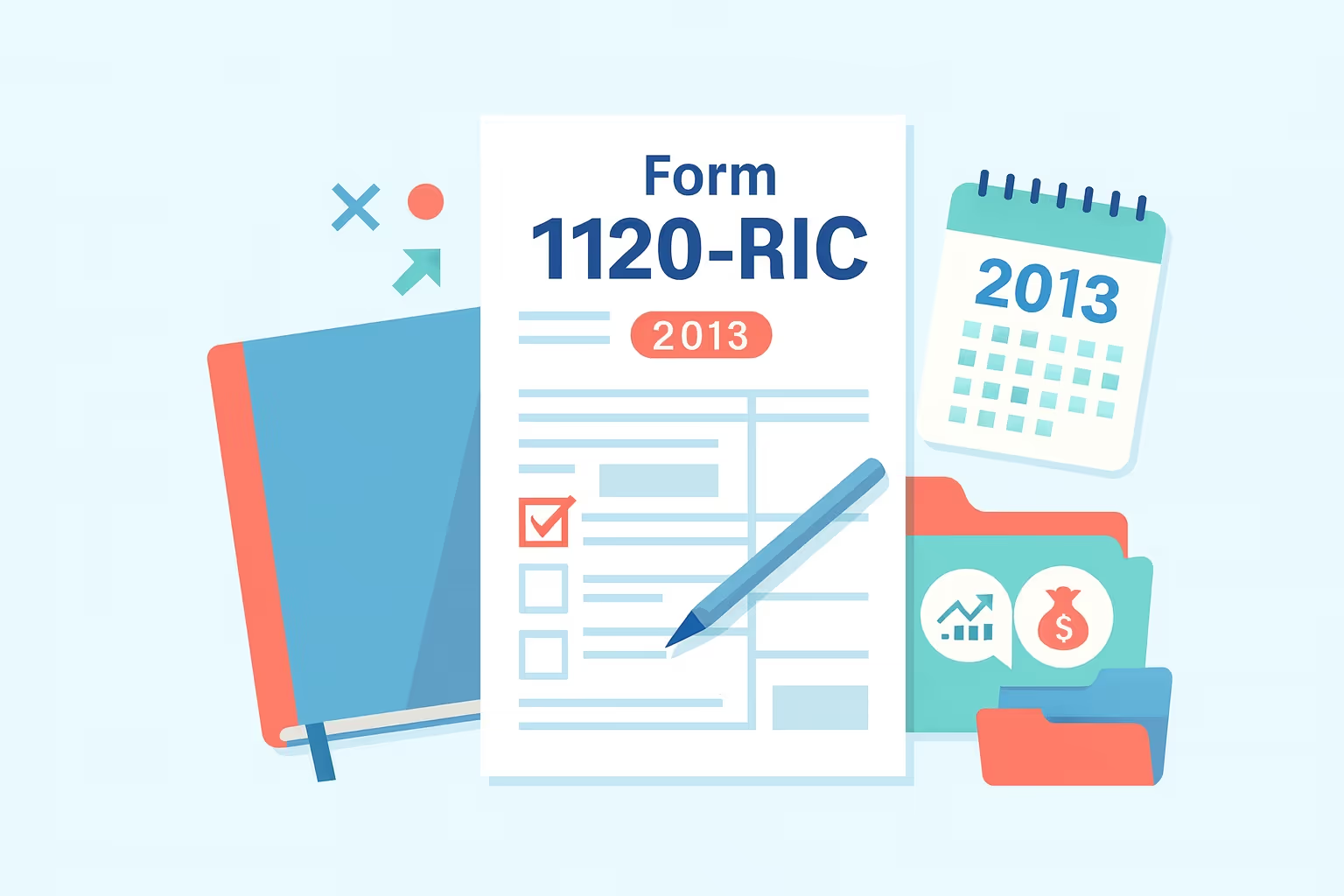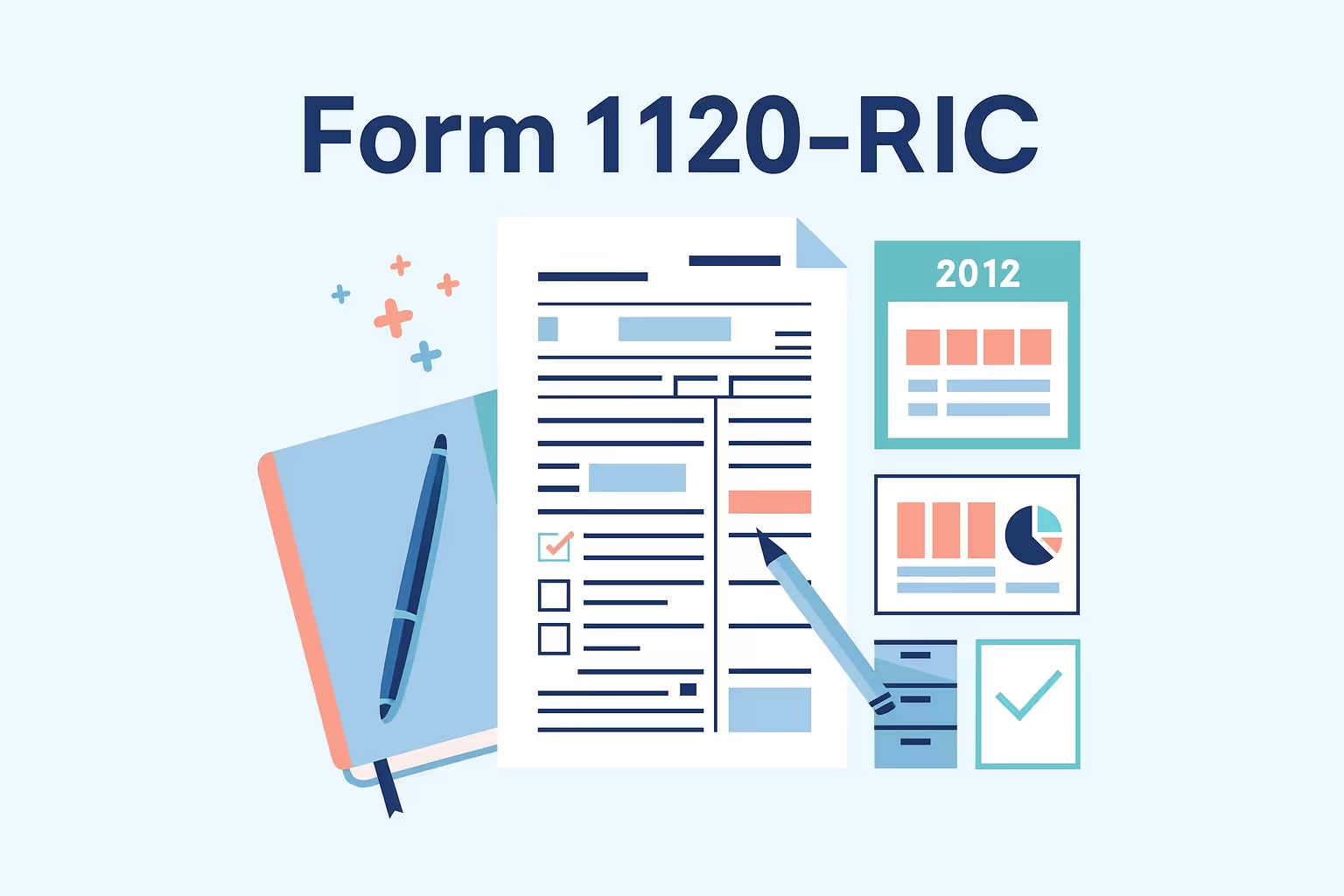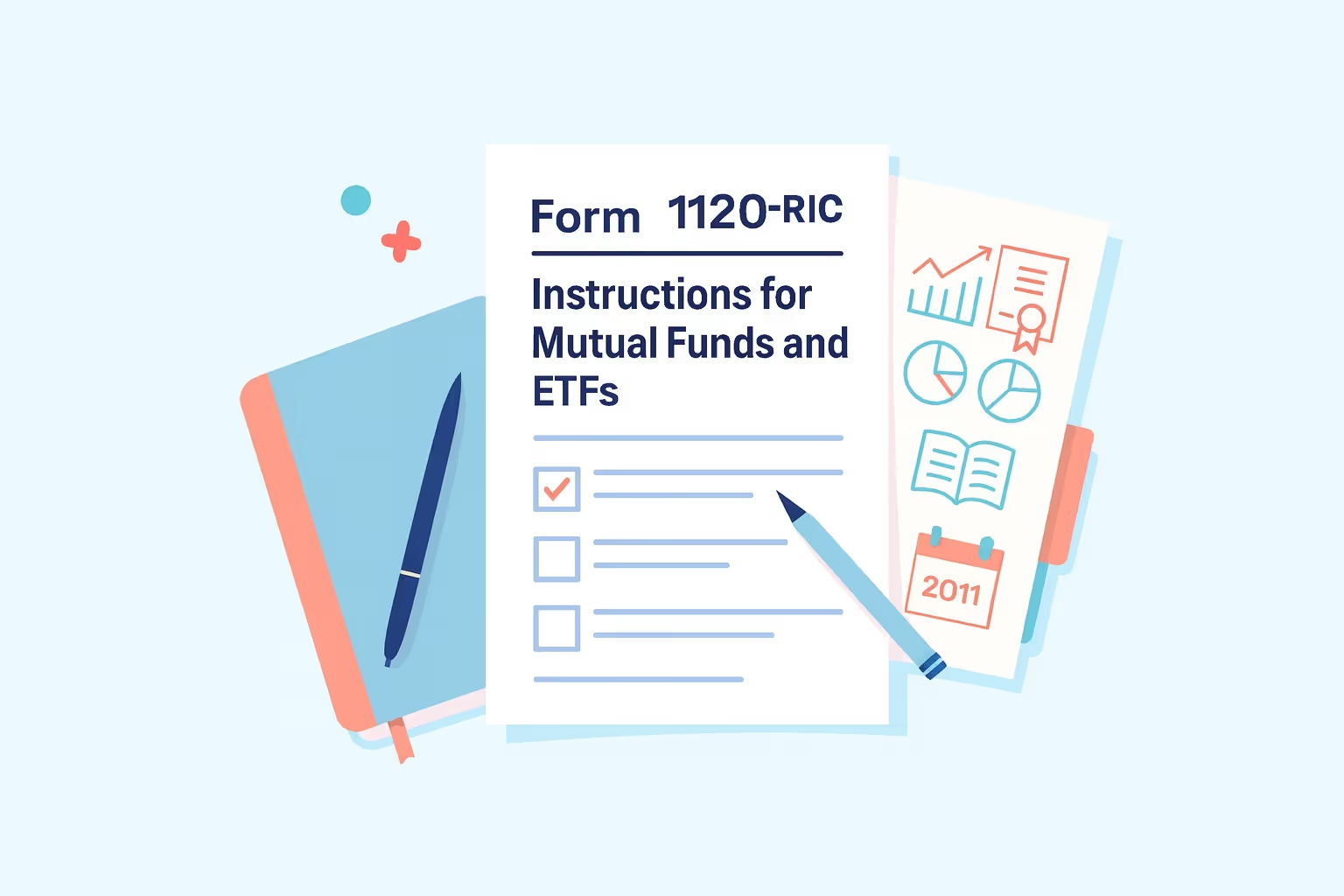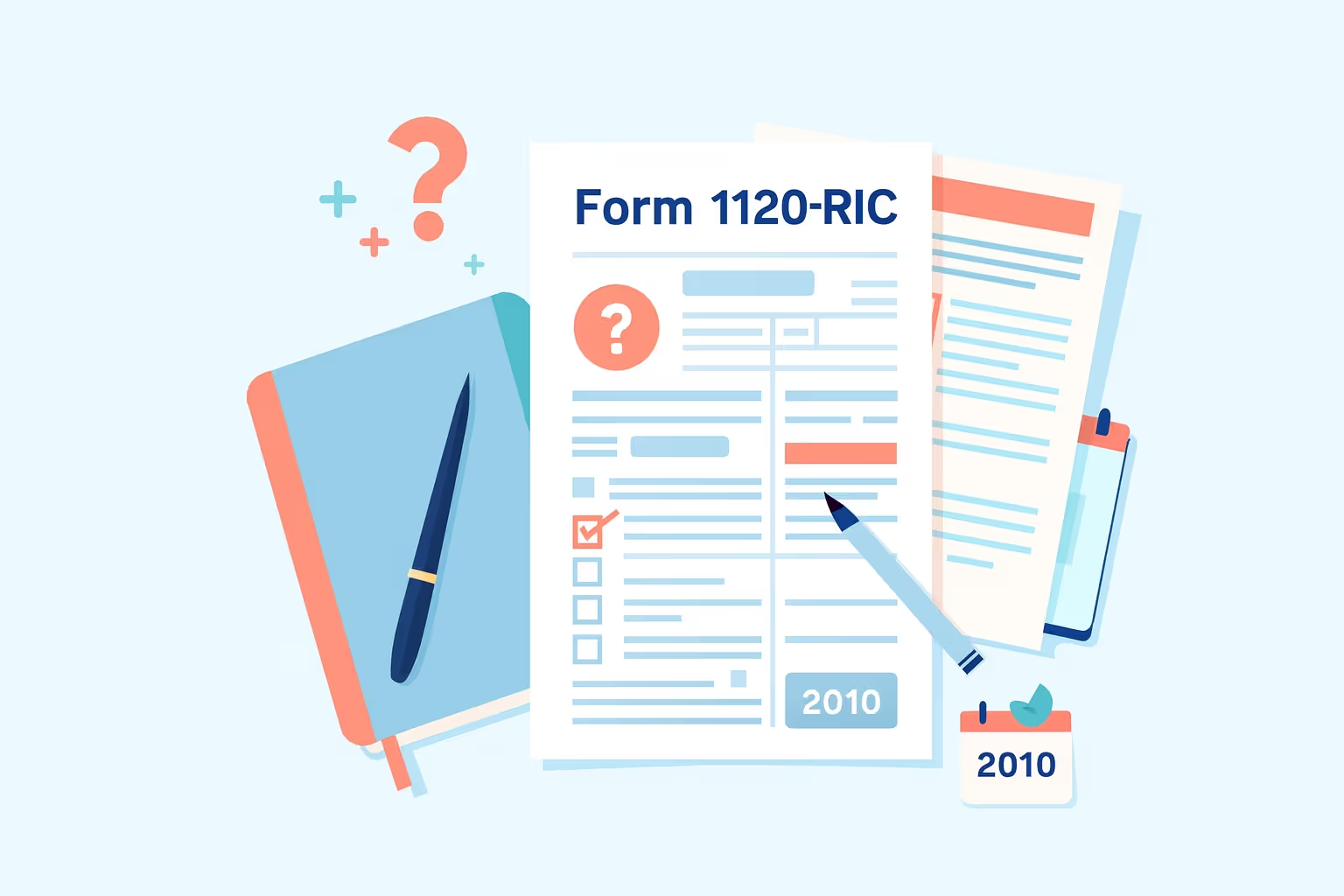
What IRS Form 1120-RIC (2025) Is For
IRS Form 1120-RIC is the official income tax return of regulated investment companies. It reports gross income, taxable income, and income tax liability for mutual funds, exchange-traded funds, and unit investment trusts. A regulated investment company uses this form to show profits, expenses, and deductions that affect its net income and total tax. The Treasury Internal Revenue Service uses the information to verify compliance with federal tax law and confirm the corporation’s RIC status election for the tax year.
When You’d Use IRS Form 1120-RIC (2025)
A domestic corporation files this return for regulated investment purposes if it qualifies as a regulated investment company under the Internal Revenue Code. This form applies when the investment company has taxable income, dividends paid, or capital gain dividends distributed to individual shareholders. A return for regulated investment companies must also be filed when claiming deductions, reporting net investment income, or computing taxable income for the current or final return in a calendar year.
Key Rules or Details for the 2025 Tax Year
- Each regulated investment company must file an income tax return even if no income tax liability exists for the tax year.
- RIC status election requires the company to meet asset and diversification standards under the Securities and Exchange Commission regulations.
- The due date is the 15th day of the 4th month after the close of the corporation’s tax year.
- Companies must include accompanying schedules, such as Schedule D for net capital gains and other income adjustments.
- Total income includes gross income, tax-exempt interest, exempt interest dividends, and net foreign currency gain from securities loans or investments.
- Total deductions may cover accounting and legal services, custodian fees, registration fees, investment advisory fees, and other deductions allowed under tax law.
- Employment credits and fewer employment credits must be reflected when computing total tax and total deductions.
- The paperwork reduction act notice reminds preparers to keep accurate forms and check applicable boxes to report the correct total assets and total value.
Learn more about federal tax filings from our Forms hub
Step-by-Step (High Level)
Step 1: Gather Financial and Investment Information
The investment company must collect data on dividends paid, capital gains, and gross income from investments. Include details on expenses, deductions, and other incomes, such as tax credit bonds and treasury stock transactions.
Step 2: Complete Income, Deductions, and Credits Sections
Compute total income, total deductions, and taxable income using the separate instructions provided by the IRS. Include deductions for accounting and legal services, custodian fees, and investment advisory fees directly affecting total tax and earnings.
Step 3: Calculate Taxes and Payments Due
The investment company must calculate the total tax imposed, considering income tax liability, employment credits, and excise taxes. Use IRS forms to determine taxes on net capital gain, dividends, and tax-exempt interest under applicable boxes.
Step 4: Review, Sign, and Submit the Return
The preparer shown must ensure that all applicable boxes are completed accurately. Attach accompanying schedules, verify total assets and total value, and submit the corporation’s return electronically to the Internal Revenue Service or by mail before the filing deadline.
Common Mistakes and How to Avoid Them
- Some investment companies fail to include Schedule D or the required schedules, which causes processing delays. Reviewing the return carefully before submission helps prevent missing attachments and penalties.
- Many regulated investment companies misreport gross or taxable income, resulting in underpaying taxes. Verifying figures against financial statements and records ensures accurate total tax calculations.
- Errors occur when corporations omit dividends paid or capital gain dividends, overstating profits. Keeping detailed dividend records and confirming payout data prevents these reporting inaccuracies.
- Late filing of the income tax return increases tax and interest on unpaid amounts. Tracking deadlines and submitting early helps maintain compliance and avoid extra costs.
- Incorrect deduction of accounting, legal, or custodian fees affects total deductions. Properly categorizing professional service expenses according to IRS instructions helps ensure accuracy and avoid amended filings.
What Happens After You File
Once the investment company submits IRS Form 1120-RIC (2025), the Internal Revenue Service reviews the form, schedules, and accompanying documents. If the total tax was overpaid, the corporation may receive a refund or apply it to the next tax year. If errors are found, the IRS will discuss corrections directly with the preparer shown or request additional information. Companies should maintain assets, forms, and deduction records to support future filings or audits.
FAQs
What is IRS Form 1120-RIC (2025) used for in regulated investment companies?
Regulated investment companies use IRS Form 1120-RIC (2025) to file an annual income tax return reporting taxable income, deductions, dividends, and total tax owed to the Internal Revenue Service.
Who must file an income tax return for regulated investment companies?
Every domestic corporation classified as a regulated investment company under Subchapter M must file an income tax return, even when no income tax liability exists for that tax year.
How does a regulated investment company report gross income and deductions on Form 1120-RIC?
When computing taxable income, a regulated investment company reports gross income, dividends paid, and deductions such as accounting and legal services, custodian fees, and investment advisory fees.
What forms or schedules accompany Form 1120-RIC, U.S. income tax return?
The corporation must attach Schedule D for net capital gain, separate instructions, and accompanying schedules that detail dividends, other income, and total deductions to complete the form accurately.
How can an investment company correct an error in its tax return for regulated investment purposes?
If a regulated investment company discovers errors in taxable income or deductions, it must file an amended Form 1120-RIC to correct the return and update total revenue and tax amounts.
What if an investment company changes its RIC status election during the tax year?
When a company modifies its RIC status election, it must notify the Securities and Exchange Commission and the Internal Revenue Service. The change may require filing a final return and computing taxable income under new guidelines.
How does IRS Form 1120-RIC handle income from mutual funds and exchange-traded funds?
Mutual and exchange-traded funds use Form 1120-RIC to report investment income, dividends paid, and capital gains to the Internal Revenue Service as part of their annual regulated investment company filing.
For more resources on filing or understanding prior-year IRS forms, visit IRS Form 1120-RIC: Regulated Investment Company Tax Return Guide.

























